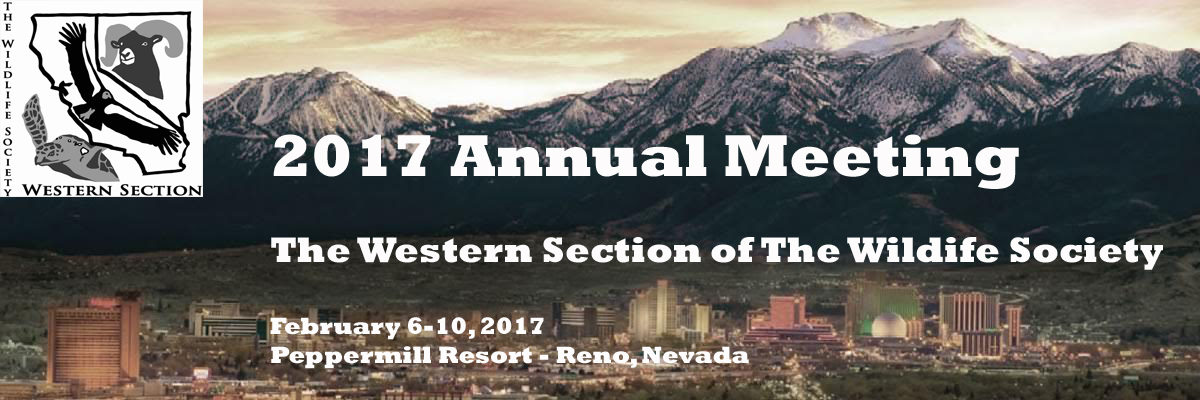2017 Annual Meeting
Welcome to Reno!
64th Annual Meeting of The Western Section of TWS
Fellow wildlifers, please join us at the 2017 annual meeting of our section to be held at the Peppermill Resort near the airport in Reno, Nevada. We have a wonderful slate of activities, networking events, and professional paper sessions scheduled that I am sure you will not want to miss.
Our theme this year is “Invasive species: globalization and bad decisions.” Invasive species can be both local and global problems that affect wildlife directly and indirectly. “Globalization” here is cast in the broad sense whether invasions are facilitated by currently expanding global trade or just movement (past or present) of species across borders for any reason. Similarly “bad decisions” as used here is broadly meant to be decisions that are made either knowingly (e.g., pet trade, direct introduction of species, horticulture trade) or by accident and indifference (e.g., failure to consider the consequences of actions like dumping of ballast water from ships) that result in establishment of invasive species. Because of the nature of this topic it transcends the immediate topic of the biology of invasive species to encompass the arenas of economics, politics, law, philosophy, and ethics. Hence, the issues surrounding invasive species and their impacts are enormously complex, highly contentious, politically divisive, and are often technical complex to resolve. This is an issue that will affect almost every wildlifer in their career.
In addition to a technical session devoted to invasive species, we have roundtable breakfast sessions, and a plenary session also devoted to invasive species. Our plenary session will be a novel format featuring two outstanding individuals: Dr. Daniel Simberloff of the University of Tennessee, Knoxville and Dr. Karen Poiani, Executive Director of Island Conservation who will engage in a free-flowing conversation about invasive species. Dr. Simberloff is a world authority on invasion biology while Dr. Poiani leads an organization that confronts the realities of invasive species impacts on a daily basis. For as long as I can remember, I have always enjoyed listening to knowledgeable and intelligent people engage in meaningful conversation – it can be mesmerizing and sow the seeds for ideas that will later bear fruit in unexpected ways. I hope this rings true for you as well when you spend the plenary with Drs. Poiani and Simberloff. To enhance the relevance of our plenary, I am asking members who would like to hear about particular but general invasive species issues too please send me a message suggesting either a question or a topic for consideration by our interlocutors. You can send these directly to me at gutie012@umn.edu and I will forward them to our plenary speakers.
We also have as our keynote speaker, Mr. Juan Palma, who is the Director of the Nevada Chapter of The Nature Conservancy. Mr. Palma had a distinguished career in federal service, retiring as director of the Utah state office of the Bureau of Land Management, before joining TNC. He will also engage in a discussion with conservationists about key conservation issues around the western US.
To foster professional development and topics of particular interest to members, we are again sponsoring several pre-conference workshops including a North American Pika Symposium, a Sage Grouse Symposium, an Altamont Pass Symposium, a Wildlife Biologist Construction Awareness Training (WildC.A.T.), and a Wilderness First Aid certification class. These professional development events provide opportunities for retaining professional currency and have important implications for your career advancement. Visit our conference website for more details about these symposia and other events at the conference.
Throughout my career, TWS meetings have provided many things to me. Among these were the opportunities to present my research, learn from others, learn about the society, and to network. The size of our section meeting is very conducive to networking and I look back now at the many opportunities I had during meetings to establish future collaborations, generate new ideas, and reinvigorate my enthusiasm for wildlife conservation as well as to make new friends and colleagues. Therefore, I hope you will share your time with us and to help us build a stronger Western Section of TWS.
R. J. Gutiérrez, TWS-WS President-Elect
2017 TWS-WS Annual Meeting Chair
Professor and Gordon Gullion Endowed Chair Emeritus
University of Minnesota

